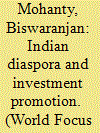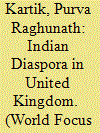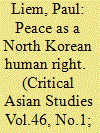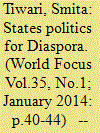|
|
|
Sort Order |
|
|
|
Items / Page
|
|
|
|
|
|
|
| Srl | Item |
| 1 |
ID:
131457


|
|
|
|
|
| Publication |
2014.
|
| Summary/Abstract |
This research examines the role of the Lebanese Armenian diaspora (LAD) during the unstructured conflict that was the second Lebanese civil war, which extended from 1975 until 1990. This research has two aims. The normative aim is to find patterns of diasporic activity in conflict such as to support positive activities and discourage negative activities. A second is to focus on an empirical case study of the LAD in order to demonstrate that the diaspora encouraged peace-making initiatives and discouraged peace-wrecking. Importantly, the LAD as a political actor in Lebanese society played a positive role in promoting dialogue, cooperation, conflict resolution and reconciliation and had a significant impact on politics in general and conflict behaviour in particular. This study concludes that it is worth studying diaspora behaviour in conflict because a diaspora could be a powerful actor in conflict resolution and peace-making.
|
|
|
|
|
|
|
|
|
|
|
|
|
|
|
|
| 2 |
ID:
128205


|
|
|
|
|
| Publication |
2014.
|
| Summary/Abstract |
The Indian government's recent high level committee report on the e Indian Diaspora estimates that almost 20 million people of Indian origin live overseas. India has the second largest diaspora in the world. The overseas Indian community estimated at over 25 million is spread across every major region in the world. Some section of the Indian diaspora have acquired global identity and are promoters of the emerging concept of global citizenship.
|
|
|
|
|
|
|
|
|
|
|
|
|
|
|
|
| 3 |
ID:
128176


|
|
|
|
|
| Publication |
2014.
|
| Summary/Abstract |
After 1950s a large number of Indians migrated to United Kingdom (UK) with cultural, traditions and religious values and practices, which included practice of caste discrimination too. As Dr. BR Ambedkar anticipated, the Indian migrants will carry the caste system to other regions of earth and it would become a problem of the world. This prediction came true as cast discrimination has indeed migrated with the Indian Diaspora to east and south Africa, Mauritius, Fiji, Surinam, the middle east (for example in Bahrain, Kuwait, the United Arab Emirates), Malaysia, the Caribbean, the United Kingdom, North America, and other regions (Natural 2001). With the other Indian Diaspora dalits (untouchables) of India also migrated to the UK. It has been estimated that around 250000 dalits are living in the UK (CERD 79, UK Report.).
|
|
|
|
|
|
|
|
|
|
|
|
|
|
|
|
| 4 |
ID:
127768


|
|
|
|
|
| Publication |
2014.
|
| Summary/Abstract |
This essay analyzes the "human rights" framework that evolved, paradoxically, as a way to address human rights and human security needs in the Democratic People's Republic of Korea (North Korea) by withholding humanitarian assistance from that country. This framework turns on the premise that the North Korean "regime" is the source of the society's ills, that it is unwilling to implement radical reforms needed to restore its economy for fear that they would undermine its rule, and that it maintains its grip upon society by means of propaganda and repression. Regime collapse, some argue, will thus lead to a better life for the North Korean people. Informed by this view, in combination with "intelligence" sources that predict the imminent collapse of the "regime," U.S. policy has been loath to provide any assistance, including food aid, that might prolong the life of the state. By viewing North Korean society today in the context of its historical experience before and since the decline of its economy starting in the early 1990s, this essay challenges assumptions that underlie the "human rights" argument for regime collapse. It explores alternative reasons for the society's unexpected survival and argues that analysis of North Korean society in abstraction from the state of war in which it is situated, fails to offer realistic options for addressing the human security of the North Korean people.
|
|
|
|
|
|
|
|
|
|
|
|
|
|
|
|
| 5 |
ID:
128145


|
|
|
|
|
| Publication |
2014.
|
| Summary/Abstract |
Migration is a natural continuous and spatial phenomenon. People move from one place to another and create Diaspora in the form of transnational network. As Sheffer says, modern Diasporas are "ethnic minority groups of migrant origins residing and acting in host countries but maintaining strong sentimental and materials links with their countries of origin their homelands". (Sheffer, 1986:3). Modern Diasporic communities which live outside but maintain link with their country of origin are getting larger and stronger, and influencing both domestic politics and foreign relations of a states.
|
|
|
|
|
|
|
|
|
|
|
|
|
|
|
|
|
|
|
|
|